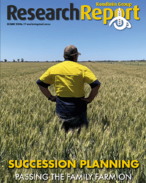This article is 2 years old. Images might not display.
Announced today, the Coles Finest Certified Carbon Neutral Beef brand includes seven premium quality cuts of beef, from eye fillet to porterhouse steak.
The beef range, available in Victorian stores this week with a national rollout over the next 12 months, is certified carbon neutral from paddock to shelf to the Australian Government's Climate Active Carbon Neutral Standard.
Over the past two years, Coles has been working with beef farmers across Victoria and New South Wales to help calculate and reduce its emissions.
Coles chief executive officer, Steven Cain, said the launch of Coles Finest carbon neutral beef was a great example of Coles working with suppliers to achieve better sustainability outcomes.
"When we announced our Sustainability Strategy just over a year ago, we said we'd work with all our stakeholders to achieve our Together to Zero emissions ambitions and to be Australia's most sustainable supermarket," Cain said.
"Coles Finest Certified Carbon Neutral Beef is a testament to the hard work of our beef producers and their commitment to sustainable practices, and we're thrilled that they're taking this important step with us."
The packaging for the new beef range is fully recyclable and made from 90 per cent recycled and plant-based sources, an Australian innovation by Coles' packaging partner Plantic.
Delatite Station cattle farmers Mark and Fenella Ritchie, from north-east Victoria, have been supplying Coles for 10 years, and are now among the beef producers working with Coles to deliver certified carbon neutral beef.
"We are really pleased to be part of the carbon neutral beef project with Coles. We are always looking to produce the finest quality beef with a strong commitment to environmental and animal welfare values that are backed up with an evidence-based approach to our decision making," Mark said.
As part of the carbon neutral beef program, Coles works with farmers to identify ways to reduce emissions from their operations, such as using renewable energy, changing herd management practices for more efficient reproduction and to maximise growth, and use of genetic selection to improve herd health.






















